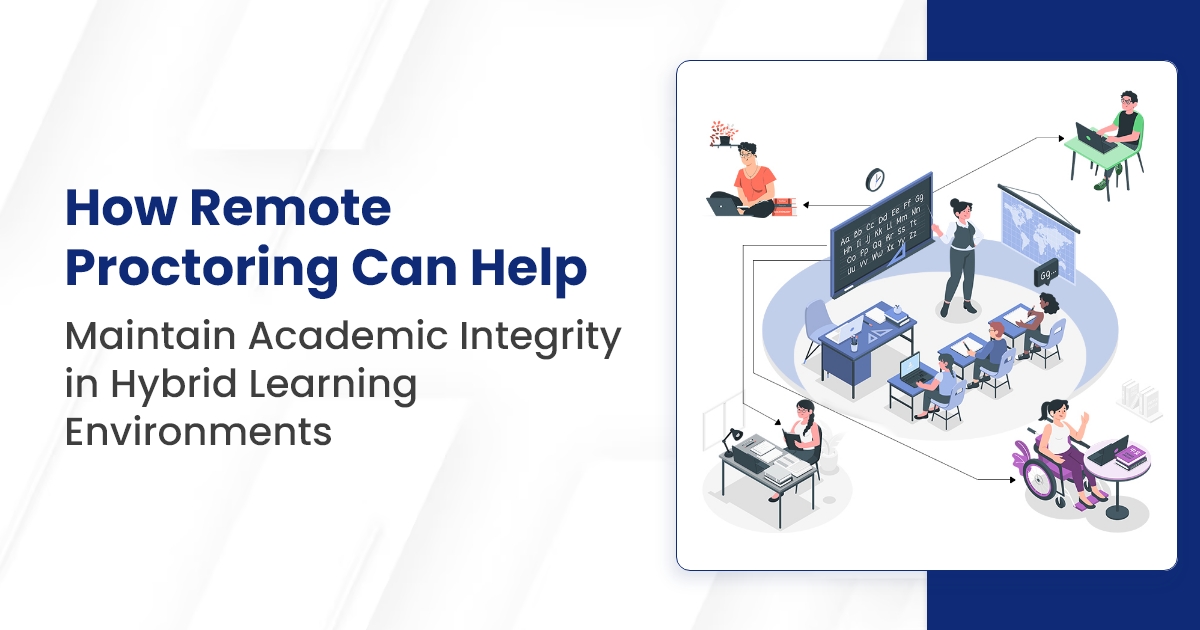In the course of educational reforms, there is a growing trend of embracing the blended mode of learning. Nonetheless, the enduring concern of providing academic integrity during the administration of online assessments is becoming threatening to institutions. At this intersection, remote proctoring, an examination monitoring solution, can be integrated. With the introduction of such proctoring software, educational institutions are able to conduct their online examinations with the same decorum resolved for face to face assessments.
What is Remote Proctoring?
Remote Proctoring is defined as supervision of the students through some means of technology while undertaking online examinations. This is a new more modern learning strategy that eases learning but at the same time secures the examination process. Using online proctoring software, any institution can ensure that the candidates are monitored even at a distance, thereby ensuring that the assessments are conducted in a just and open manner.
Benefits of Remote Proctoring in Hybrid Learning
- Heightened Safety:
One of the main advantages of remote proctoring is the raised security levels. Adopting AI proctoring systems in institutions definitely creates a threat to cheating and possible means of cheating as well.This level of meta oversight takes care of the academic integrity, which means that every student is appraised on their knowledge and skills. - Flexibility and Accessibility:
The RPE’s (Remote Proctored Exams) let the students take the exam anywhere anytime.This is very important in the case of students who are learning in a hybrid model. Online proctored assessment tools allow the candidates to take the assessment disregarding the existing physical boundaries thus creating a more equitable learning system. - Cost-Effectiveness:
The use of proctoring tools can save schools a lot of money. Remote proctoring solutions eliminate much of the necessity for physical testing centres and proctors, making the testing process much more efficient. This kind of efficiency would be very helpful in larger institutions that do hundreds of assessments. - Comprehensive Monitoring Options:
There are many types of monitoring available through remote proctoring, which can be catered to meet the requirements of schools. For example, Think Proctor, by Think Exam, features a comprehensive line of proctoring solutions to accommodate the changing needs of education.
Features of Think Remote Proctoring:
AI-based Image Proctoring: This high tech feature utilises facial recognition to authenticate the candidates during the entire duration of the exam to avoid the possibility of someone other than the registered individual taking the exam.
AI-based ID Verification: This aspect also adds more security to the testing process itself because it would be difficult for someone to impersonate the test taker if the candidate’s identity is checked before and during the exam.
Recorded Monitoring: This way entire testing sessions can be recorded and watched at a later time, which is good for those tests where actual monitoring is impossible.
Live Monitoring: For the more serious exams, Think Proctor has live proctoring, so actual proctors watch over the exam as it happens, and if there’s ever a problem, the proctor can intervene right away.
How Remote Proctoring Solutions Support Academic Integrity
- Real-Time Interventions:
Remote proctoring services make it possible to monitor in real time, and if any suspicious activity is noticed, the proctors have the ability to intervene. This way, it guarantees that academically, the test taking process is upheld. - Comprehensive Reporting:
There are many online proctoring software with reporting features that show exactly what the candidate did during the exam. These kinds of reports are so helpful to institutions when trying to study trends and refine their evaluation procedures. - Building Trust in Online Assessments:
If schools use good proctoring systems, then students will feel more confident that online tests will be taken fairly. This sense of trust however is a necessity in order to promote student involvement and activity in the hybrid classroom.
Conclusion
With hybrid learning environments ever changing, upholding academic integrity is still a very important issue. Remote proctoring is a strong alternative that ensures the security of online exams, yet at the same time allows for flexibility and availability for the student. Think Proctor along with other tools make it possible for institutions to go from proctored testing to online testing without compromising the level of integrity.








